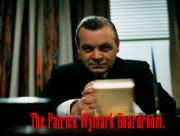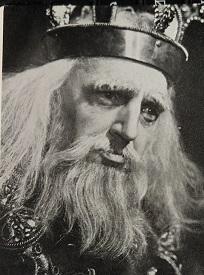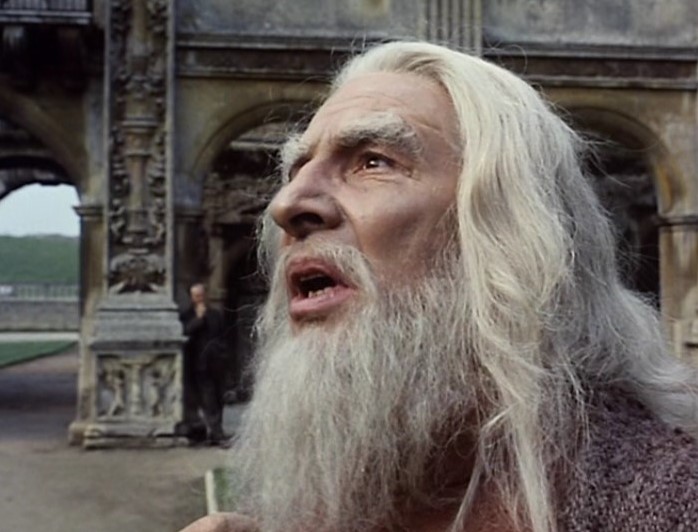
The Lear Affair - the Old Vic 1952
"I am a man more sinned against than sinning." Lear

Stephen Murray as King Lear
As the new managing director of the Old Vic, Tyrone Guthrie believed the public wanted to see "star names" and hired former actor-manager Sir Donald Wolfit (Blood of the Vampire) for the season. Actor Robert Gillespie*, commented that, "He was never bad in anything - and sublime as Lear ... but his performances were solo's - with cue giving minions on stage." Wolfit opened in Christopher Marlowe's Tamburlaine The Great, a production which ran for five weeks from 24 September 1951 supported by , "a gifted cast (with) not a wrong note from anyone." (Gillespie) A further week was scheduled at the Shakespeare Memorial Theatre, Stratford, from 29 October 1951, but Wolfit took umbrage at the fact that his crowd-pleasing London performance was displaced by the production of Othello (referred to here) He either refused to go on, or asked for a day's leave which was refused. Either way, Lee Montague stepped into the lead.
* Robert Gillespie, Are You Going To Do That Little Jump? - The Adventure Continues (2021) see here
Wolfit returned to the Old Vic playing Lord Oglesby in The Clandestine Marriage. Robert Gillespie recalls that the scene of Oglesby putting himself together at his dressing table, "took ages - and Donald got a round for it.". However, Wolfit was again upset at his comedy being replaced by Guthrie's own A Midsummer Night's Dream from Boxing Day 1951 and despite being billed to appear in King Lear and Timon of Athens either resigned or was sacked. Douglas Wilmer, in Stage Whispers opined that, "After falling out with Guthrie and also his fellow actors, who strenuously objected to his attention-drawing tricks, he left the company as soon as he could find a convenient loophole in his contract."
His replacement was 40 year-old Stephen Murray - an experienced stage actor who had taken the lead in John Drinkwater's Abraham Lincoln in 1940 and had played Gladstone in Thorold Dickinson's The Prime Minister (1941). The company, directed by Hugh Hunt, started a 35 performance, seven week tour in January 1952. Opening in Rotterdam , the production visited the Netherlands, Belgium, Germany, Finland, Sweden, Norway and Denmark. It was praised as "superb" by Swedish critics and in a letter to Theatre World, Miss K van Woerden gave her impression of the performance at the Hague. " Although I sat high up in the gallery, I must confess that I did not lose one word, which I think is a high praise to the actors, English being moreover a foreign language to us. Even some of our critics mentioned the wonderful diction and audibility of every actor."
Murray's interpretation was that Lear, "should be as gigantic as possible at the outset, so that the fall is all the greater." It was reported that Murray experienced great discomfort in overheated theatres due to the padded costume he wore as Lear. Whether this combination of heat and winter chill undermined his health is not clear. Allan Holloway comments that, "the British Council Tour must be one of the craziest pieces of scheduling imaginable. The itinerary included Finland and was part of a Foreign Office effort to fly the flag during a particularly heightened period of tension during the Cold War...there were a lot of receptions and meet-and-greets outside the performances which Murray, as de facto head of the company, had to attend which would have suited Wolfit but which Murray was unused to."When the production returned to its London opening, there were already complaints from audiences on the provincial tour, who had booked to see the great Wolfit. Allan Holloway adds: "There was little time for fresh rehearsal or re-staging when the production opened at the Old Vic in February 1952, to the great grievance of the cast and Murray was already probably suffering from the viral complaint that would put him out of the production altogether." Murray faced a disappointed audience of critics on March 3rd 1952. The press were generally unimpressed by the entire production but singled out Murray. P.L.Mannock in the Daily Herald (4 March 1952), wrote, "Stephen Murray gives this almost unplayable role a rugged and a fine sonority except in lapses of audibility.". J.C.Trewin in The Sketch(12 March 1952) wrote that, "Murray...lacks the giant's stride." There were other complaints that Murray was inaudible, drowned out by distracting sound effects of thunder drums, wind whistles and trumpets. The Stage( 6 March 1952) piled in, reporting that Murray, "is liable to drop his voice and mumble and mutter into his..beard." Murray and the production found their sole defender in Theatre World (April 1952). Editor Frances Stephens reported that on the third night of the run, "every actor was audible...many of the performances were outstanding, whilst Stephen Murray's Lear seemed...a noble and most reasonable interpretation."
Frances Stephens concluded that,"One cannot condemn the critics for what they no doubt honestly experienced on the first night, but...often revisions are made by the producer following adverse first night criticisms. But only rarely do the critics take the opportunity of revisiting a play and maybe of publicly reversing their original opinion." Elizabeth Marryatt responded in the May edition that, "I went to the play rather half-heartedly, having read the most unencouraging criticism...Although I was sitting at the back of the gallery, I heard every word without the slightest difficulty".
But by then, it seems, the damage was done. On 17 March, Murray was stricken with laryngitis and 23 year-old Canadian understudy John Colicos got his chance to play Lear (The Stage 27 March 1952). Under doctor's advice, Murray withdrew from the role and William Devlin (Sir Gerald Merle in The Plane Makers) took over as Lear for the rest of the London run and the subsequent provincial tour, beginning in April in Brighton before returning to the Old Vic for one week on 19 May. Devlin had played Lear in 1934, 1936, 1947 and 1948 (on TV). J.C. Trewin had used Devlin's performance to batter Murray, declaring it one of "Olympian majesty". While the West London Advertiser was unimpressed, finding that Devlin, "deafens us but he does not move us (and plays the aged Lear)...with the vigour of one half his age.. However, Devlin found more success when he played Lear for the first time in his home town of Aberdeen, where the local paper concluded he was "a Lear with a voice that whispers and reverberates in turn and leaves not a syllable unheard."

William Devlin as King Lear in 'Civilisation' (BBC 1969)
As subsequent audiences warmed towards the production, there was grudging praise for the rest of the cast, which included Leo McKern as The Fool, Andre Morell as Kent, Lee Montague as Edmund, Freda Jackson as Goneril, Coral Brown as Regan ("as terrifying as wild tigresses" (The Stage)and Daphne Slater replacing the tour's Charmian Eyre as Cordelia.
Al Murray, Stephen Murray's great nephew, notes that Kenneth Williams wrongly claimed in his diaries that Murray couldn't find work after the critics pile-on over Lear. However, as Allan Holloway points out , "after recovering he went on to direct Arthur Murphy's "The Way to Keep Him" at The Arts Theatre in the summer of 1952 featuring Avice Landon, Ernest Clark and Jill Bennett.He also appeared in the Hungarian Uprising drama, "Shadow of Heroes" by Robert Ardrey with Dame Peggy Ashcroft at the Piccadilly Theatre in 1958. ". In 1958 Murray took over the role of Simon Crawford from Michael Denison in Hostile Witnessat the Theatre Royal Haymarket, and in 1967 starred with Wilfrid Brambell and Leslie Phillips in The Deadly Game at the Savoy theatre.
Stephen Murray was already a familiar face to film and TV audiences, starring in the Hammer film Four Sided Triangle in 1953 and later under contract to Associated British Pictures. He also starred in the long-running BBC radio comedy The Navy Lark from 1959 to 1977. But in 1971 the "painfully shy" Murray revealed in a TV Times interview that he paced the streets rather than see himself on TV. "No matter how hard you try, your interpretation of a character never quite comes out the way you want."
'Looker-On' in Theatre World(April 1952) commented, "Since Richard Burbage created the mighty role of King Lear, no actor has played it under such extraordinary circumstances as Stephen Murray, whose forceful performance...has been grossly maligned by the critics, but warmly appreciated by the public."
Thanks to Arthur S, Allan Holloway on Twitter and Al Murray (Stephen Murray's great nephew) for further comment.